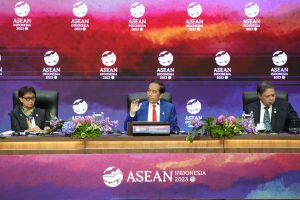The Association of Southeast Asian Nations (ASEAN) has always been careful to maintain its neutrality, and as such has been exceedingly unwilling to become embroiled in any hegemonic struggle. Moreover, by inviting the great powers to gatherings like the East Asia Summit (EAS) and the ASEAN Regional Forum (ARF), where ASEAN itself sits in the driver’s seat and plays a balancing role, the association has carved out a unique position for itself.
Unfortunately, former U.S. President Donald Trump showed no interest in the EAS and never showed up, which demonstrated scant regard for ASEAN. The subsequent Biden administration signaled a pivot to ASEAN, which ASEAN welcomed as a “return of the U.S.” May 2022 saw a U.S.-ASEAN Special Summit held in Washington, at which President Joe Biden proudly declared, “We’re launching a new era – a new era in U.S.-ASEAN relations.” It would seem that ASEAN-U.S. relations have rebounded.
Yet it was Vice President Kamala Harris who was dispatched to the EAS in Indonesia this September. Biden attended the G-20 summit that was held in India immediately after the EAS and made a stop in Vietnam on his way back. While in Vietnam, he upgraded the U.S.-Vietnam relationship two levels, from a “comprehensive partnership” to a “comprehensive strategic partnership” on par with China and Russia, heralding a new era in U.S.-Vietnam relations.
ASEAN Disunited
Biden passing up the EAS came as a disappointment to ASEAN member states (apart from Vietnam), and especially Indonesia, which is chairing the association this year. However, it clearly reflects how countries outside the region feel about ASEAN. One of the principal goals of the association, which started out as a group of small countries, was to “to maximize the agency of its members to preserve national autonomy and pursue their own national interests as they define them.” In other words, by focusing on the interests of the region as a whole and having member states move in the same direction, the association has been able to maintain its bargaining power with the great powers.
However, the past decade has seen an ever more noticeable lack of unity among ASEAN member states. At the ASEAN Foreign Ministers Meeting in 2012, the chair, Cambodia, supported China’s claims to the South China Sea, with the result that the meeting failed to issue a joint statement – the first time that had happened since ASEAN’s founding.
More recently, ASEAN members have differed over how to respond to the coup in Myanmar that took place in February 2021. Myanmar’s ruling junta has taken advantage of this to prevent the implementation of the Five-Point Consensus, which was supposedly launched at the ASEAN special summit on Myanmar in May 2021, leading to increased skepticism towards ASEAN.
Although economics has been the driver of ASEAN integration to date, here too member states have increasingly been pursuing their own agendas in recent years, at the expense of regional cohesion and interests. For example, Indonesia banned the export of raw nickel ore in January 2020 and raw bauxite ore in June 2023, with the aim of attracting foreign investment in the refining and processing sector, producing and exporting processed minerals with higher added value, and creating employment. Although the WTO subcommittee (panel) ruled these measures to be in violation of agreements in November 2022, Indonesia has shown no signs of lifting the bans.
This attitude has also spread to other member states. Although the Philippines has not announced an export ban, plans were discussed in January 2023 about imposing a tax of up to 10 percent on nickel ore exports. On September 11, Malaysian Prime Minister Anwar Ibrahim announced that his country would consider banning exports of rare-earth metals to “prevent exploitation and loss of resources.”
ASEAN’s efforts to create a single market and production base have attracted considerable direct investment, a driver of economic growth. However, if member countries prioritize their own interests and undermine ASEAN integration, corporate investment may shift to large countries with sizable domestic markets and subsidies, with smaller countries being overlooked.
This concern was very much in evidence in the ASEAN Concord IV “Jakarta Declaration on ASEAN Matters: Epicentrum of Growth” adopted at the ASEAN Summit in September. The declaration recommended the issuance of a concord because the chair, Indonesia has become alarmed about ASEAN skepticism, a disconnect, and the association becoming subsumed in the “Indo-Pacific.” As such, the members declared that the ASEAN community is important to its citizens and that it is the center of growth in ASEAN, the Indo-Pacific, and beyond.
If the disregard for ASEAN-centricity and the “home-first” policy is left unchecked, the association’s position as an epicenter of world growth will be in jeopardy. ASEAN will need to use peer pressure to nip protectionist measures in the bud. It is time for the chair, Indonesia, which suggested Concord IV, to take independent action.
































